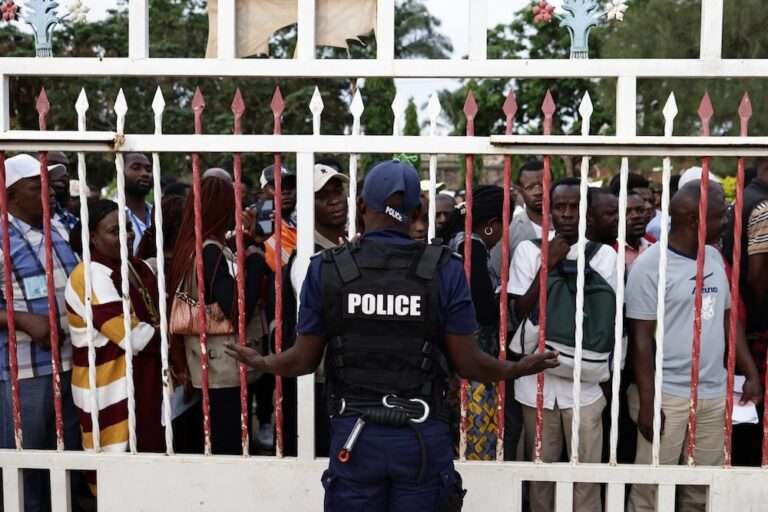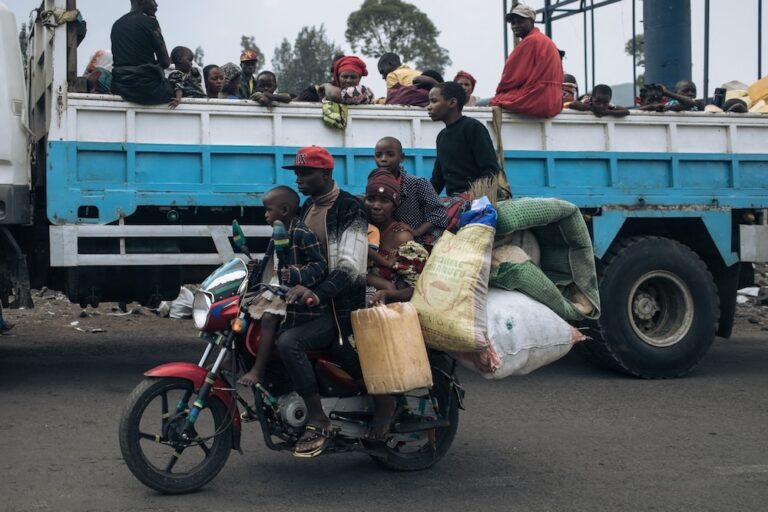(JED/IFEX) – The following is a 10 December 2000 JED press release: 10 December 2000: 52nd anniversary of the Universal Declaration on Human Rights Subject: Publication of the 2000 Report on Press Freedom in the Democratic Republic of Congo On Sunday 10 December 2000, the international community commemorates the fifty-second anniversary of the Universal Declaration […]
(JED/IFEX) – The following is a 10 December 2000 JED press release:
10 December 2000: 52nd anniversary of the Universal Declaration on Human Rights
Subject: Publication of the 2000 Report on Press Freedom in the Democratic Republic of Congo
On Sunday 10 December 2000, the international community commemorates the fifty-second anniversary of the Universal Declaration of Human Rights (UDHR). From this text – which is of universal importance, and to which the Democratic Republic of Congo is a signatory – emerge the principles guaranteeing freedom of expression and press freedom. Article 19 of the document is also featured in the International Covenant on Civil and Political Rights and the African Charter on Human and People’s Rights. This is evidence of the importance that humanity places on freedom of expression as a mainspring of the blossoming of all people and the development of nations.
For the third consecutive year, on this anniversary date, Journaliste en danger (JED), a non-governmental organisation defending free expression, is releasing its 2000 Report on Press Freedom in the Democratic Republic of Congo. This report attempts to detail all the cases of press freedom violations which occurred this year, and is prefaced by well-known journalist Christine Ockrent.
Ockrent was the leading woman newscaster for the television news on channel Antenne 2 during the 1980s and editor-in-chief of L’Express at the beginning of the 1990s. She is currently a newscaster for the nightly news programme on the France 3 station, and accepted our request for her to speak from the heart about press freedom. She rightly believes that freedom of the press is a fundamental right. Everyone is aware that the media has so much influence that, for better or for worse, it can be a counter-force capable of rivaling the power of the State. This is dangerous and worrisome for those engaged in the information profession.
Congolese journalists have faced this danger throughout this past year, which is drawing to an end. At least forty-two journalists have been detained for both long and short periods this year. Forty of the detentions occurred in Kinshasa, Lubumbashi, Tshikapa and Matadi, and two of them occurred in the occupied eastern region of the country. Even more serious is the fact that in North Kivu, Crispin Kandolo, a freelance photojournalist, was killed in Kahuzi Biega Park while working for a group of UNESCO experts. His attackers did not even give him a proper burial. His body was burned along with those of the other team members.
In Kinshasa, as we celebrate the fifty-second anniversary of the Universal Declaration of Human Rights, four journalists remain in prison for exercising their profession. Freddy Loseke Lisumbu La Yayenga, publisher of the weekly La Libre Afrique, has been detained since 31 December 1999. He was tried and sentenced by a special court, the Court of Military Order (COM), for insulting the army. At the end of December 1999, Loseke wrote two articles that alleged a plot against the head of state. He must serve a three-year sentence.
Emile-Aimé Kakese Vinalu, publisher of Le Carrousel newspaper, has been detained since 23 June 2000. He was tried and sentenced by the COM for “treason”. Le Carrousel published three articles, including an editorial, which called for the unarmed internal opposition to unite. According to the military prosecutor, this call for a unified opposition constituted an incitement to revolt against the established authorities. Kakese must serve a two-year sentence.
Jean-Pierre Ekanga Mukuna, director of La Tribune de la Nation newspaper, was arrested on 17 August 2000, during the Kakese case, when he was called to testify. He was sentenced to two years’ imprisonment because he works for a newspaper that is openly hostile toward the authorities.
Feu d’Or Bonsange Ifonge, a journalist with L’Alarme, was arrested on 12 November 2000 and relocated three weeks later to the CPRK (Kinshasa Penitentiary and Reeducation Centre, formerly the Makala Central Prison). He was accused of threatening state security by the COM. His trial date has yet to be set. Not only was the incriminating article (Tshisekedi states: Kabila will fall on 15 December 2000) not written by Bonsange, but it was also published in another newspaper, L’Alerte Plus.
Furthermore, the 2000 Report notes that 15 journalists were arrested for longer than 48 hour periods and were released thereafter, with or without a trial. 23 other journalists were denied their freedom for periods of up to 48 hours. At least fourteen journalists told Journaliste en danger (JED) that they were mistreated or tortured during their incarceration. Eight journalists were threatened or otherwise harassed. The most scandalous threats were broadcast by the public station RTNC (Radiotélévision nationale congolaise) against two independent newspapers, Le Potentiel and Le Phare. These included a call to murder journalists from these newspapers. (See details in the charts on pages 47, 48 and 49 of the report).
Paradoxally, repression has also been directed against media which are close to circles of power. The ardent readers of the daily L’Avenir, available throughout the country and also on the Internet, were deprived of their newspaper for three days. The daily, which is among the only newspapers to own and operate its own website, which it runs from Kinshasa, was shaken by a raid on its personnel and computers by Congolese Armed Forces soldiers. The attack on L’Avenir provides ample evidence of how the presumption of innocence does not exist in our country. Everyone is guilty. The vaguest suspicion leads to automatic arrests and seizures, with verifications done after the fact.This represents a loss of profits not only for the newspaper but the country as a whole.
The greatest scandal of the year was the expropriation of RTKM for political reasons and the return of the cult of personality in the pure style of the years of the one party-state. The Ministry of Communications has added close to three hours a day of propaganda messages and advertising to the new programming schedule of RTKM, renamed RTNC 4. The Congolese people saw this on 27 November 2000, on the occasion of the head of state’s birthday. All the stations, including those focused exclusively on religious programming, sang in unison.
This has taken place despite the fact that the Congolese people remember the following anecdote from 1997, which took place aboard the South African ship Outeniqua, on the occasion of one of two meetings between Kabila and Mobutu, under the auspices of President Nelson Mandela. This incredible story was told on several occasions by President Laurent-Désiré Kabila himself, who would laugh heartily while recounting it. On that day, on the Congolese coast (Brazzaville), Kabila, whose troops were at Kinshasa’s doorstep, looked at the ailing Mobutu and allegedly told him: “Mobutu…who made you god? Who told you that you were god?” He did not get an answer. The Leopard was no longer The Leopard. The god had died, leaving in his place a solitary man, destroyed by his illness.
If Mobutu had had the strength to respond to the triumphant Kabila, he certainly would have told him to follow his stare. And this stare would have been directed towards his associates of the past and present. For it was these very associates – many of whom had already fled the sinking ship – who had him descending from the clouds and encouraging him to believe that he was infallible, until the day he fled the country, under pressure from Kabila’s little green men, who were applauded by almost all the Congolese people.
To create this god-man, the associates needed the media. As the famous saying went: “We should continue the hype until the message gets through”.
Kinshasa, 10 December 2000


